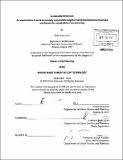Sustainable Urbanism : an examination of environmentally responsible neighborhood developments in Europe and lessons for sustainable urban planning
Author(s)
Kasioumi, Eirini
DownloadFull printable version (19.08Mb)
Other Contributors
Massachusetts Institute of Technology. Dept. of Urban Studies and Planning.
Advisor
Brent Ryan.
Terms of use
Metadata
Show full item recordAbstract
The emergence of the sustainable development concept at the end of the 1980s triggered the intensification of the environmental sustainability discourse in urban design and planning. The vision of sustainable urbanism includes calls for limitations to urban growth, protection of sensitive areas, compact design, clean forms of transportation, low impact building construction, use of renewable resources, and healthy agreeable living environments. While there is growing agreement on the necessity of making sure that new developments comply with these mandates, there is less to say about how to do so. This thesis explores the planning processes underlying three new neighborhood developments in Sweden and Germany broadly regarded as exemplary green developments. I find that the implementation of the sustainable urbanism vision was possible through a municipality-led process with direct control of the land use, built form, and resource supply through legally binding instruments such as detailed plans and development contracts; the consistent build-up of technical capacity in both the public and private sector; and an openness to learning and adaptation. The findings confirm that local government authority in Sweden and Germany still largely reflects the notion of the benevolent state, and suggest that such a role is important for the endorsement of the value-laden notion of sustainability. Transferability of the lessons in the US context depends on the creativity of solutions that will need to tap on latent potential in the public and private sector and research institutes.
Description
Thesis (M.C.P.)--Massachusetts Institute of Technology, Dept. of Urban Studies and Planning, 2010. Cataloged from PDF version of thesis. Includes bibliographical references (p. 121-128).
Date issued
2010Department
Massachusetts Institute of Technology. Department of Urban Studies and PlanningPublisher
Massachusetts Institute of Technology
Keywords
Urban Studies and Planning.